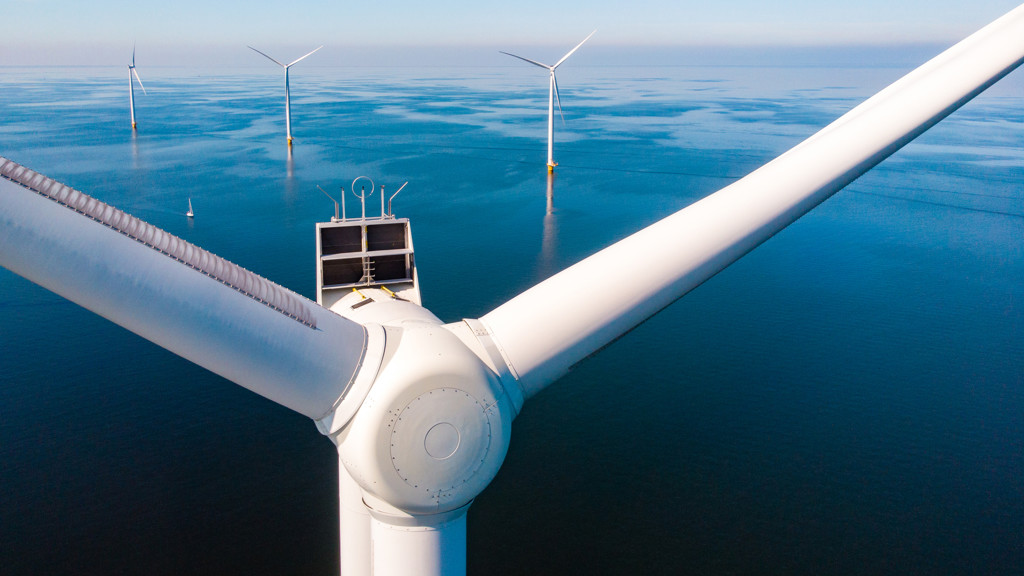The inappropriate allocation of risk, need for new standardised contracts, and how increased collaboration can reduce waste and improve delivery, were key debating points from an IMCA hosted industry panel at Global Offshore Wind 2023 in London on 16 June 2023 which featured speakers from bp, GE Renewable Energy, and DEME Offshore.
Held at the largest dedicated offshore wind event in the UK, the panel discussed the current opportunities and challenges facing offshore wind and how the introduction of sustainable contracting could alleviate pressure across the supply chain and unlock the investment required for the industry to meet government expectations for offshore wind in delivering the energy transition.
Joining IMCA’s CEO Iain Grainger for a lively 45-minute discussion, were Hugo Bovey (Managing Director, DEME Offshore), Richard Huxley (Commercial Director, GE Renewable Energy) and Richard Haydock (Project Director, bp).
Iain Grainger, IMCA CEO, said: “It is clear to me that the huge demand for equipment, vessels and people in the offshore wind sector far exceeds the capacity available today and it is now time for a new approach. The current approach to contracting in offshore wind is unsustainable over the longer term and it is time for cross-industry collaboration, which will be vital to finding the solutions to the challenge we collectively face in this area.”
IMCA, which represents companies working on offshore energy projects around the globe, has been campaigning for sustainable contracting for offshore wind. It has recently published a set of 28 contracting principles for the sector to follow.

It is clear to me that the huge demand for equipment, vessels and people in the offshore wind sector far exceeds the capacity available today and it is now time for a new approach... it is time for cross-industry collaboration, which will be vital to finding the solutions to the challenge we collectively face.Iain Grainger
Allocating risk
On the need to re-allocate risk in contracts, Hugo Bovey (DEME Offshore) argued that it made sense for it to be allocated to the party best placed to deal with it: “I cannot control the weather. I cannot control permits. I cannot control a lot of things as a Contractor, but I can control my own performance and that’s something that I can take the risk of.”
Richard Haydock (bp) agreed: “If you place risk in the right place, you’re probably going to get a better overall outcome. If you try and push too much risk to the Contractors, then they will price for it. You need to look at who’s best placed to deal with the specific risk.”
Richard Huxley (GE Renewable Energy) added: “We want to promote a more positive and collaborative way of contracting. I think it’s almost as simple as that, but what we need to make sure is that what we’re running towards looks better than what we’re coming away from.”

New standard approaches
Iain Grainger (IMCA) shared with the audience how offshore wind has tried to adopt contracts from onshore projects which are totally unsuitable for offshore. These have resulted in a misallocation of risk which has caused severe financial losses across the supply chain. He also pointed to the success of “CRINE” (Cost Reduction In the New Era), which was introduced in offshore energy in the 1990s and brought the industry together to lower costs. One major success was the development of standardised contracts (“LOGIC“) which is an approach still in use to this day.
Reminding the audience and panel of IMCA’s recently published offshore wind contracting principles, he also highlighted the potential role of industry associations in bringing the offshore wind sector together on this topic.
Richard Haydock (bp) said: “Spending months developing bespoke contracts every time you contract is inefficient. If we could get to some form of standardisation, that always helps. I think we should look at the example of what oil and gas did with JIP33 – where you have standard contracts, expectations on HSE, and specifications.”
Richard Huxley (GE Renewable Energy) added: “The longer you negotiate a contract, the less time you spend driving value. We need to switch that so that we’re spending a lot more time on creating value than just writing contracts.”
Hugo Bovey (DEME Offshore) said: “We are very familiar with LOGIC; It definitely works and addresses the problems that you have in the maritime construction industry. Contract forms which are close to that would definitely work in this industry [offshore wind] as well.”
Collaborating to improve performance
Richard Haydock (bp) said: “Early engagement is probably one of the key things there, because the people that are closest to the work are the ones that will understand how to make the savings […] You do need to engage with your supply chain early so that you can create that opportunity.”
Hugo Bovey (DEME) said: “We always talk about cost and how can we make things more affordable. What we see as Contractors is that there [are] a lot of opportunities to save money. For example, lenders’ technical advisers who have demands which are often about [completing] the last 1% percent, which costs you 20% of the money. We need to have smart people in this industry who are reasonable and asking, ‘is this important?’ Make the right [choices] and we can save a lot of money.”
Richard Huxley (GE Renewable Energy) added: “I think it’s just getting rid of inefficiencies. It’s having that more holistic view that you need to promote a little bit more. And I think that’s really what we’ve been talking about with the contracts – It’s all about getting a holistic view that just makes sense.”








